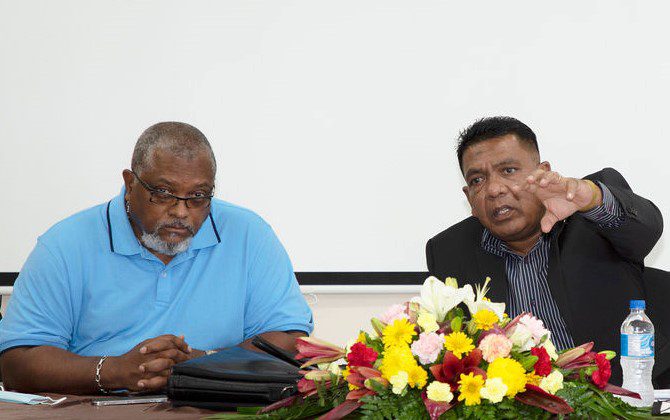
Barbados and Guyana continue to strengthen their relationship by working to secure greater access to food supplies through boosting this island’s agriculture sector and by ensuring the continuation and expansion of imports from Guyana to help meet local needs.
Last Saturday, a joint meeting between the two countries was held at the Ministry of Agriculture and Food and Nutritional Security with Barbadian importers of rice, fruit and vegetables to listen to their needs and address concerns, while outlining future plans between Barbados and Guyana.
Minister Indar Weir; Permanent Secretary, Terry Bascombe, and Chief Agriculture Officer, Keeley Holder, met with a Mission from Guyana, which was jointly led by Minister of Agriculture, Zulfikar Mustapha, and Minister of Tourism, Industry and Commence, Oneidge Walrond, as part of a follow-up of the Guyana-Barbados St. Barnabas Accord.
Other participants included Special Envoy to Suriname and Guyana, Alphea Wiggins, and Ambassador to CARICOM, David Comissiong.
Minister Weir and Ms. Holder both stressed the need for Barbados to be as self-sufficient as it could be, seeking to supplement any shortages from within CARICOM.
They noted that Guyana has a key role to play as it can provide Barbados with pest-resistant planting material, especially where there is heavy demand for such, as is the case with cassava, avocados, citrus fruit, peanuts and coconuts.
It was also noted that knowledge sharing, skills transfer and other forms of technical assistance from Guyana, especially in adopting climate-resistant approaches to farming (e.g. building of shade houses), would help Barbadian farmers drive greater efficiencies and diversity into new areas of food production, while creating opportunities for established and new farmers.
They pointed out, however, that there is an immediate need for consistent high-quality agricultural products at competitive pricing, which can be sourced from Guyana.
Minister Zulfikar Mustapha agreed that Guyana could support Barbados’ thrust for self-sufficiency and could help fill any gaps where local production did not meet demand.
He noted that he visited a Farmers’ Market early that Saturday morning to see the market demand; to better understand the source of the products being sold on the market, and to interact with those selling to get their feedback on needs.
He stated that Guyana could supply much of the produce that he saw on sale, of consistent quality and at good pricing, including rice, avocados, citrus fruit, peanuts, coconuts, oranges, pineapples, and even shrimp.
Mr. Mustapha was, however, quick to indicate that shipping costs continue to rise exponentially and are now more than the food costs; noting that shipping would continue to increase.
The Minister stated that farmers in Guyana were experiencing increased efficiencies and passing them on in the form of lower pricing, but shipping had been offsetting the improved pricing.
He added that direct shipping between Guyana, Suriname and Barbados could be arranged, with similar arrangements made for the Eastern Caribbean, which would help control the cost of freighting.
Minister Mustapha said the planned establishment of the Barbados Food Terminal at Lears would bring about significant process improvements and cost efficiencies in the importation and distribution of food supplies to Barbados and the Eastern Caribbean, with the Guyana Marketing Corporation (GMC) playing a critical role as a consolidation point in Guyana. The GMC would also help to guarantee supply, quality and the best pricing.
Ambassador David Comissiong affirmed that the planned food terminal would benefit CARICOM and bring needed efficiencies to member states as well.
Troy Barker
